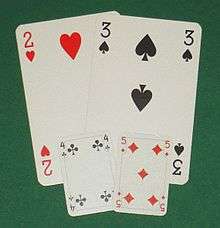Patience (game)
Patience, or solitaire as it is known in the US and Canada, is a genre of card games that can be played by a single player. Patience games can also be played in a head-to-head fashion with the winner selected by a scoring scheme.
In the US, the term solitaire is often used specifically to refer to solitaire with cards, while in other countries solitaire specifically refers to peg solitaire. Both Solitaire and Patience are sometimes used to refer specifically to the Klondike form of Patience.
Overview
The purpose of Patience generally involves manipulating a layout of cards with a goal of sorting them in some manner. It is possible to play the same games competitively (often a head to head race) and cooperatively.
Patience games typically involve dealing cards from a shuffled deck into a prescribed arrangement on a tabletop, from which the player attempts to reorder the deck by suit and rank through a series of moves transferring cards from one place to another under prescribed restrictions. Some games allow for the reshuffling of the deck(s), and/or the placement of cards into new or "empty" locations. In the most familiar, general form of Patience, the object of the game is to build up four blocks of cards going from ace to king in each suit, taking cards from the layout if they appear on the table.
There is a vast array of variations on the patience theme, using either one or more decks of cards, with rules of varying complexity and skill levels. Many of these have been converted to electronic form and are available as computer games. Examples of variants on the familiar Patience theme that may be played with an ordinary pack of cards include Bisley and Prince Albert. Basic forms of Klondike solitaire and FreeCell come with every version of Microsoft Windows from Windows 3.0 (though FreeCell was introduced in Windows 95) to Windows 7. Ever since the release of Windows 8, Windows Store offers six unique card games which can be downloaded for free from in the form of the Collection. There are also many applications for Android and iOS.
History
The game is most likely German or Scandinavian in origin.[1] The game became popular in France in the early 19th Century reaching England and America in the latter half. The earliest known recording of a game of patience occurred in 1783 in the German game anthology Das neue Königliche L'Hombre-Spiel. Before this, there were no literary mentions of such games in large game compendiums such as Charles Cotton's The Compleat Gamester (1674) and Abbé Bellecour's Academie des Jeux (1674).

Patience was first mentioned in literature shortly after cartomantic layouts were developed circa 1765, suggesting a connection between the two. This theory is supported by the name of the game in Danish and Norwegian, kabal(e). An 1895 account describes a variant of the game exclusively used for cartomancy.[1]
The first collection of patience card games in the English language is attributed to Lady Adelaide Cadogan through her Illustrated Games of Patience, published in about 1870 and reprinted several times. Other collections quickly followed such as Patience by E. D. Cheney (1869), Amusement for Invalids by Annie B. Henshaw (1870), and later Dick's Games of Patience, published by Dick and Fitzgerald. Other books about patience written towards the end of the 19th century were by H. E. Jones (a.k.a. Cavendish), Angelo Lewis (a.k.a. Professor Hoffman), Basil Dalton, Ernest Bergholt, and Mary Whitmore Jones.
See also
- List of patience games
- Glossary of Patience terms, not including peg solitaire.
- Patience sorting, a computer algorithm
- Software Patience games:
- Eric's Ultimate Solitaire
- FreeCell (Windows)
- PySol
- Microsoft Solitaire
- Soltrio Solitaire
- Microsoft Spider Solitaire
- Hoyle's Official Book of Games: Volume 2 (featured 28 variations of Patience)
References
- 1 2 Parlett, David. "Patience". Historical Card Games. David Parlett. Retrieved 7 January 2016.
- Lee, Sloane & Packard, Gabriel. 100 Best Solitaire Games: 100 Ways to Entertain Yourself with a Deck of Cards. ; New York, N. Y.: Cardoza Publishing, 2004. (ISBN 1-58042-115-6)
- Arnold, Peter. Card Games for One. London: Hamlyn, 2002 (ISBN 0-600-60727-5)
- Moorehead, Albert H. & Mott-Smith, Geoffrey. The Complete Book of Solitaire and Patience Games. New York: Bantam Books, 1977 (ISBN 0-553-26240-8)
- Crépeau, Pierre. The Complete Book of Solitaire (a translation of Le Grand Livre des Patiences). Willowdale, Ontario: Firefly Books, 2001. (ISBN 1-55209-597-5)
- Marks, Arnold & Harrod, Jacqueline. Card Games Made Easy. Surrey, England: Clarion, 1997 (ISBN 1-899606-17-3)
External links
| Wikimedia Commons has media related to Solitaire. |
| Wikibooks has a book on the topic of: Solitaire card games |
- Patience at DMOZ
- Lady Cadogan's Illustrated Games of Solitaire or Patience, by Adelaide Cadogan, 1914, from Project Gutenberg
- Games of patience for one or more players, second series, by Mary Whitmore Jones, about 1898, original book-scan from Archive.org
 "Patience". Encyclopædia Britannica (11th ed.). 1911.
"Patience". Encyclopædia Britannica (11th ed.). 1911.- Kabale at DMOZ

